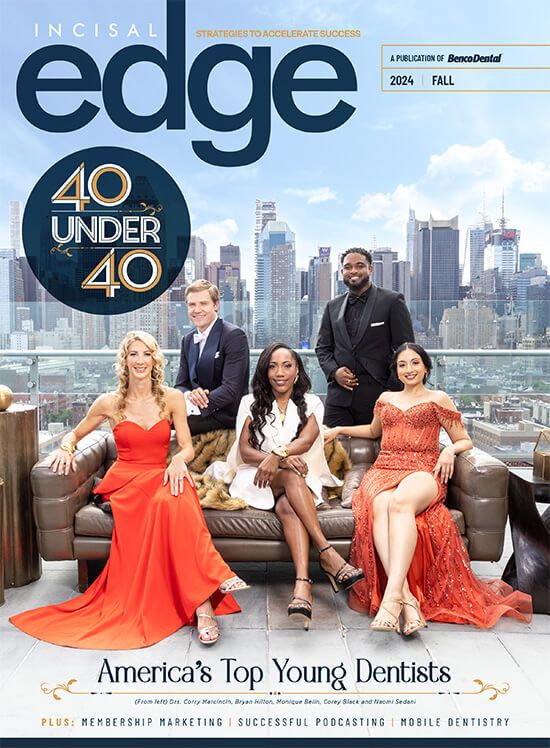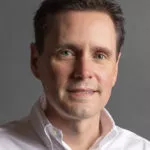Dr. Joel Danziger is the official dentist of Towson University’s athletic teams. Here’s how deals like his are structured, what it costs in time and commitment, and why he measures his success in terms of both ROI and personal fulfillment.
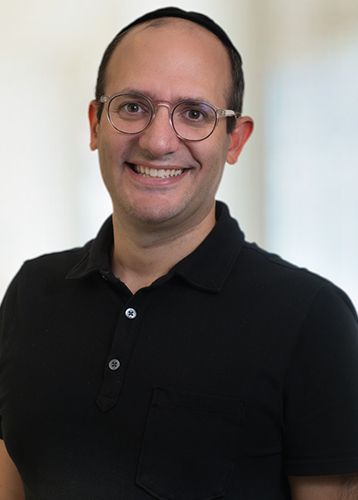
He started devoting that spare time to marketing for new patients. It didn’t work out as expected. Old-fashioned direct mail postcards were substantially outperforming his supposedly more sophisticated digital and search ads. “In retrospect, it makes sense,” he says. “Older people are generally more financially stable and better situated for fee-for-service dentistry. They trust print more than digital, and they value holding something tangible in their hands. But you also need younger patients, and the digital targeting wasn’t working; it was all over the place and just costing me money and generating almost no ROI.”
Home-Field Advantage
Dr. Danziger’s fourth-floor office in Towson, Maryland, overlooks Towson University’s Johnny Unitas Stadium, a nice perk for a former Towson undergrad with fond memories of his time there. “I’m watching lacrosse practice or football practice one day, and it hits me: Do they have a dentist for their sports programs? What do these people do if they have emergencies? I’m literally walking distance, right across the street. So I called them up and said, ‘I want to meet whoever deals with student health care.’ ”
It would take about a year after that initial contact before a deal with the Towson Tigers would be consummated. “They had a dentist who was about to retire, someone who was a farther drive away, so it was right place, right time. They were eager to talk. At the same time, they wanted to make sure it would be a good fit for both parties, so I explained my experience, my philosophy and why I have the ability to fit patients in on short notice.”
As Dr. Danziger discovered, there’s no industry-standard deal for becoming an athletic program’s official dentist. It’s not something you necessarily buy into, like becoming the official soft drink of the NFL. It may not even have a large upfront cost in the form of a sponsorship or donation. “Once we both agreed it made sense, we had to figure out the gives and takes. I just bought my practice, I have five kids (see bottom right), so writing a big check wasn’t in the cards. I approached the negotiation like, ‘What services can I give you?’ ”
A Win-Win Proposition
The school’s overriding concern was student health, so Dr. Danziger agreed to be available by call or text 24/7, and to see emergency patients within 24 to 48 hours depending on the severity of the issue. “So they get that access, and I’m always available to answer questions or follow up, which I’m OK with; it’s just my personality.” He also provides mouthguards, having finished with 30 lacrosse players just prior to our conversation. “Towson agrees to contribute a certain dollar amount per mouthguard and I cover the rest, basically as a donation. We make them in the school’s yellow color, which is cool. And the kids love that we scan, because previously they were having mold impressions done in school, and the new ones fit so much better.” Faster access to care, better results—two big wins for the university.
“It’s about taking care of students, about giving back. Emergency treatment comes first; there’s no predetermination of someone’s ability to pay.” —DR. JOEL DANZIGER
Ostensibly, Dr. Danziger is paid for the emergency patients he treats, as the school has dental insurance—“but we don’t accept insurance, so at best, we’re out of network,” he explains. Without putting too fine a point on it, Dr. Danziger says that the school and parents make a good-faith effort to satisfy the financial obligations of treatment, but there are inevitably some write-offs. “It’s about taking care of them, about giving back. Emergency treatment comes first; there’s no predetermination of someone’s ability to pay. It’s part of my contribution, and it comes back in other ways.”
If a deal like Dr. Danziger’s sounds like all give and no take, well, it certainly could be. “It’s all about what you make of it,” he says. For example, where digital advertising failed to deliver young patients, his familiarity at Towson University in general—and his proximity to campus—has attracted student-athletes and the larger student body for more than just emergency treatment. “They’re not home, they’re not near their dentists, so we also see students for all the normal things that come up.”
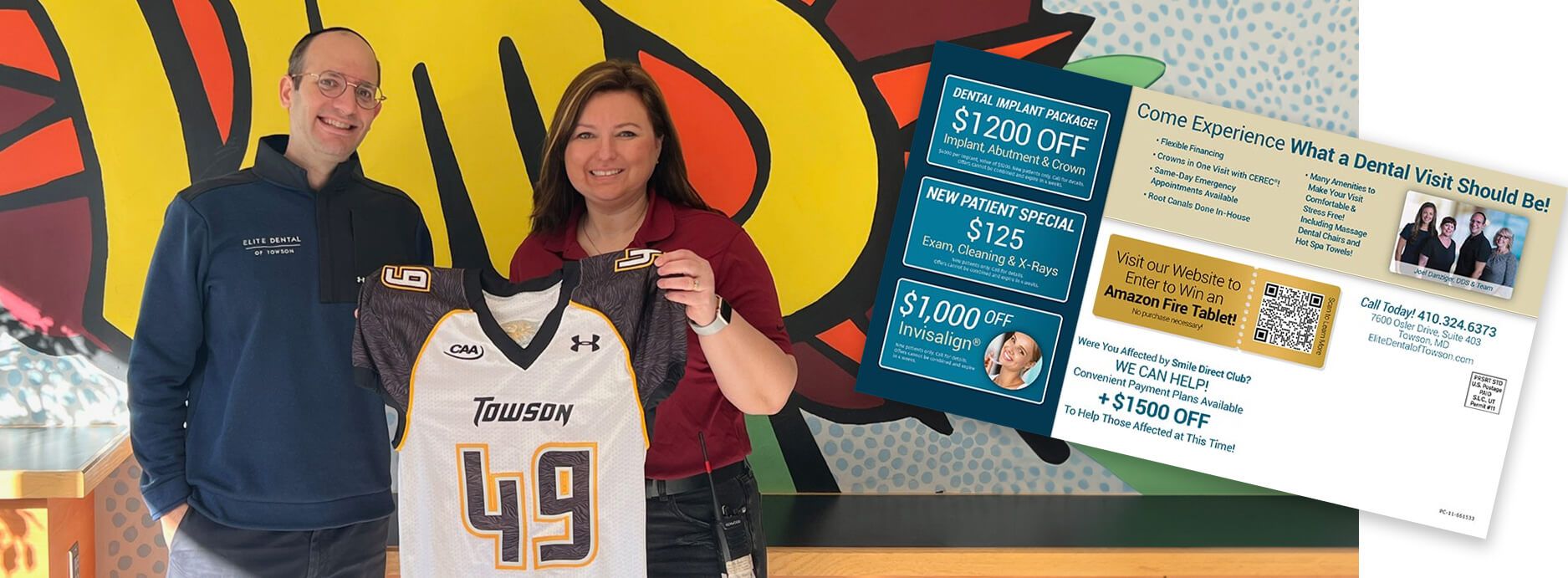
You’ve got mail: Direct mail postcards were more successful than digital advertising for Dr. Danziger, so he started thinking outside the box for ways to attract younger patients. Team player: Elite Dental of Towson has grown in size and reputation since Dr. Danziger’s deal with the Towson Tigers.
He has also created a membership plan that players, coaches and family are eligible to join. The school helps spread the word across its communications channels, and even sent an email blast to promote the program. Meanwhile, Dr. Danziger provides home care bags for players containing the usual toothpaste, brush and floss, “because what I noticed as I started seeing these players is that their home care has slipped.” It’s a give-back that also functions as a marketing tool.
Of course, some dentists would be happy simply benefiting from the publicity that comes with being an athletic program’s official dentist. Dr. Danziger says it has undeniably helped him build trust in the community, something he says is hard to put a price on. “How much money do dentists lose on things like new patient exam specials? But we do it anyway because it builds trust. You have to do it. My deal with Towson helps speed that up. There’s some familiarity beforehand with new patients. They think, ‘Here’s this doctor who’s part of the community.’ ” He even has his own way of boosting Towson: donating sports tickets to local clubs, schools and nonprofits so more kids have opportunities to attend athletic events and get exposed to college life.
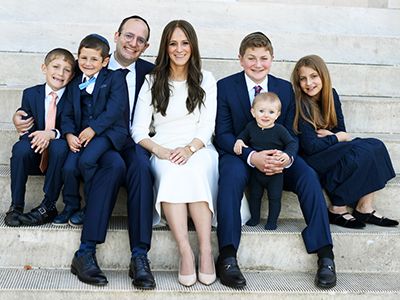
There’s nothing wrong with an old-fashioned marketing win: Buy an ad, generate some new patients, done. Obviously, Dr. Danziger isn’t relying solely on the deal with Towson to build his practice. Nor is he advocating for a primarily grassroots approach to new patient acquisition. On the contrary: Despite his lackluster results from digital marketing to date, he’s now investing in social ads with video, and obtaining successful conversions. “It’s scary, especially in the early years of a practice. You’re taking a risk, and maybe it works, maybe it doesn’t—and you pay either way.”
But a deal like Dr. Danziger’s with Towson is mutually beneficial, the risk is finite and managed—and, he says, it’s “a lot more fun, a lot more fulfilling” compared to ordinary marketing and publicity. So much so that he has begun discussions with athletic departments at other local schools. “We’ll kind of see where that goes, but if one works out, that would be amazing. You gotta look for your opportunities. I mean, it blows my mind that so many doctors have been near all these colleges, and right next to Towson in particular, and never even thought to knock on their door and see if they might need help.”
PHOTOGRAPHS COURTESY OF DR. JOEL DANZIGER
